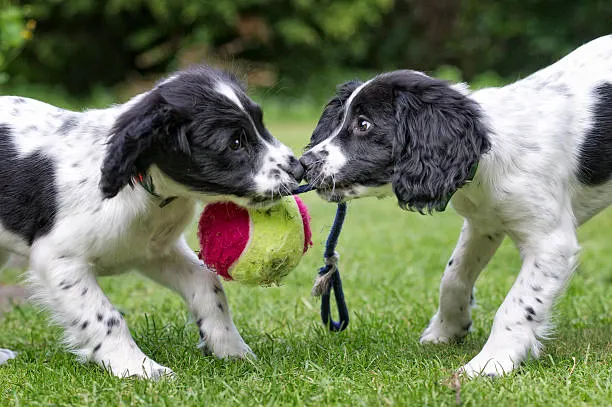
In the Literature
Christos C, Buckely LA. Veterinary-led puppy parties: a cross-sectional survey to quantify the methods and approaches undertaken within UK veterinary practices. J Vet Behav. 2022;58:1-9. doi:10.1016/j.jveb.2022.09.006
The Research …
Appropriate socialization of young puppies supports development of positive social behaviors with humans and may reduce the risk for development of behavioral concerns (eg, fear of strangers, aggression).1,2 Socialization programs (ie, puppy parties) allow puppies to interact with unfamiliar humans and age-matched puppies in a safe and controlled setting.
This study described methods used by veterinary teams in the United Kingdom when providing socialization programs for puppies. A 5-part online survey was conducted to collect client information, including participant and clinic demographics, program structure, approach to training, and client education.
Most of the 81 respondents indicated their primary motivation for organizing socialization programs for puppies was to habituate puppies and their owners to the clinic. Respondents reported these events were not expected to generate immediate income, as there was little or no charge to attend; rather, the events were used as an opportunity to teach owners about pet health care and puppy behavior. Understanding normal puppy behavior allows pet owners to have reasonable expectations and can improve their ability to identify abnormal behaviors. Identifying and addressing behavior problems early, before problems escalate, may increase the likelihood of the puppy remaining with the owner for its lifetime.3
Socialization programs for puppies were not uniformly organized and were held in various areas (eg, waiting rooms, hallways) in the clinic. Most events were led by veterinary nurses; however, team members in many clinics had not received specific training related to canine behavior.
Although the ideal structure of a maximally effective socialization programs for puppies is not yet known, there is high potential for providing long-term benefits. Results from this study suggest these events are well received by staff and owners and can easily be made available in any clinic.
… The Takeaways
Key pearls to put into practice:
Staff responsible for overseeing socialization programs for puppies should be familiar with canine body language, current puppy socialization guidelines, and updated standards of practice for humane dog training,4,5 and 1 to 2 team members should be dedicated to behavioral awareness. Behavior references and continuing education courses on normal canine behavior and body language should be available to clinic staff.
A referral network for prevention and treatment of behavioral concerns should be established. For clinics that choose not to treat behavior patients, the network should include a veterinary behaviorist and a qualified trainer who regularly attends continuing education courses and understands the importance of humane and nonconfrontational training.
The ideal puppy socialization window begins closing around 12 to 14 weeks of age, before puppies have received all vaccinations; however, the risk for contracting a life-threatening communicable disease during socialization classes is relatively low.6
You are reading 2-Minute Takeaways, a research summary resource presented by Clinician’s Brief. Clinician’s Brief does not conduct primary research.